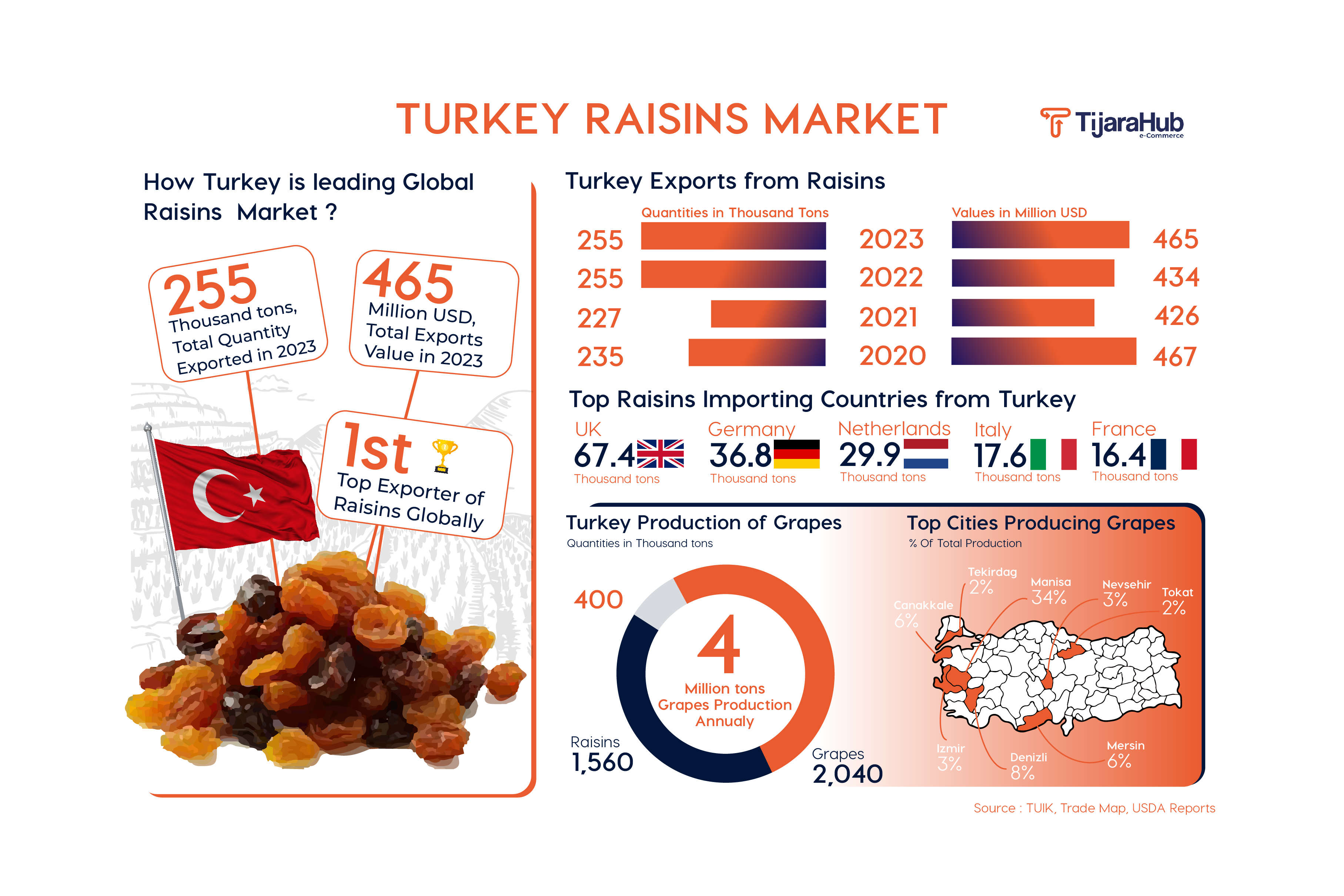Golden Gems: A Journey Through Turkey's Raisins Markets

Turkey's association with raisin production dates back centuries, rooted in its fertile soil, favorable climate, and a tradition of meticulous farming practices. The country's diverse geography, spanning from the Mediterranean to the Aegean regions, provides an ideal environment for cultivating grapes. Turkish farmers have mastered the art of raisin production, drawing upon generations of expertise to nurture the finest fruits and preserve their natural goodness through drying.
Turkey’s unique climate and fertile soil contribute to the production of high-quality dried grapes. Turkish farmers employ traditional cultivation methods combined with modern techniques, ensuring the production of premium dried grapes. These grapes undergo a meticulous drying process, preserving their natural flavor, sweetness, and nutritional content. As a result, Turkish dried grapes are highly regarded for their quality and are in high demand among wholesalers and consumers alike.
Key Statistics: Turkey Raisins Market Size & Share Analysis
Most dried grapes in Turkey are produced in Aegean (west). The most important production areas are Manisa, Izmir and Aydin. Around 35% of all grapes produced in Turkey are used for drying. The rest is sold as table grapes or used to produce alcoholic drinks, mainly raki. The sultana planted area in Turkey is increasing, having reached 74 thousand hectares in 2020. The Aegean Exporters Association, the affiliated member of the European Dried Fruits Trade Federation (FRUCOM), actively promotes exports of dried grapes from Turkey to Europe.
Most grapes are consumed in Turkey as fresh fruit in the summer and dried fruit in the winter, but some grapes are used as an ingredient to produce molasses, dried fruit pulp, Turkish delight, wine, and vinegar. Despite Turkey’s leading role in the production of raisins, domestic consumption is not stable. Domestic consumption varies based on production levels and quality, exports, and domestic price. In general, domestic consumption for raisins in Turkey is on average between 35,000 MT and 50,000 MT in a year, which is around 10% to 15% of total raisin production.
The appeal of Turkish dried grapes and raisins extends far beyond the borders of the country. Thanks to its strategic location, robust infrastructure, and commitment to quality, Turkey has emerged as a leading exporter of raisins to markets around the world. Whether it's Europe, the Middle East, Asia, or beyond, Turkish raisins find their way into kitchens and cuisines, enriching dishes with their unique flavor and texture.
In 2022, Turkey exports of dried grapes reached (278.6 thousand tons) amounting to (USD 478.2 Million),
Sultana is the most important grape variety grown in Turkey and holds the highest share of 98% of Turkish grapes exports recording (274 thousand tons). Europe is the main destination for the Turkish raisins. United Kingdom is the top importing market with a share of (24%) followed by Germany, Netherlands, and Italy with (13%), (11%), and (6%) respectively. (Source: ITC Trade Map – Turkey Dried Grapes Exports).
Discover the Diversity of Turkish Dried Grapes.
One of the most captivating aspects of the Turkish dried grapes and raisins market is its incredible diversity. From the iconic Sultana raisins to the lesser-known varieties like Malatya and Muscat, Turkey offers an extensive array of options to cater to every palate and culinary need.
- Sultana Raisins: Perhaps the most famous variety, Sultana raisins are prized for their golden hue, plump texture, and sweet flavor profile. They are widely used in baking, confectionery, and as a topping in cereals and salads.
- Malatya Raisins: Hailing from the Malatya region in eastern Turkey, these raisins are renowned for their deep brown color and rich, caramel-like taste. They are particularly favored for their use in traditional Turkish desserts such as baklava and helva.
- Muscat Raisins: With their distinct floral aroma and intense sweetness, Muscat raisins add a sophisticated touch to both sweet and savory dishes. They are often enjoyed as a standalone snack or paired with cheese and wine.

Unlock the Culinary Magic of Raisins!
Raisins are versatile ingredients that can be used in various ways in the kitchen. Here are some common applications:
- Baking: Raisins are commonly used in baking to add sweetness, moisture, and texture to baked goods such as bread, muffins, cookies, cakes, and scones. They can be added to the batter or dough directly or soaked beforehand to plump them up.
- Trail mixes and granola: Raisins are a popular ingredient in trail mixes and granola due to their natural sweetness and chewy texture. They can be combined with nuts, seeds, and other dried fruits to create a nutritious and satisfying snack.
- Salads: Raisins can add a burst of sweetness and chewiness to salads, balancing out the flavors of savory ingredients like leafy greens, nuts, and cheese. They are particularly popular in grain salads, such as couscous or quinoa salads.
- Curries and stews: Raisins are often used in savory dishes such as curries and stews to add sweetness and depth of flavor. They can be added towards the end of cooking or soaked beforehand to soften them.
- Rice dishes: Raisins are a common addition to rice dishes such as pilafs and biryanis, where they add sweetness and contrast to the savory flavors of the rice and spices.
- Stuffings: Raisins can be incorporated into stuffings for poultry, meat, or vegetables to add sweetness and moisture. They pair well with ingredients like nuts, herbs, and grains.
- Sauces and chutneys: Raisins can be used to make sweet and tangy sauces and chutneys, which can be served as condiments or used as a glaze for meats and vegetables.
- Breakfast dishes: Raisins can be sprinkled over oatmeal, yogurt, or cereal to add natural sweetness and texture. They can also be added to pancake or waffle batter for an extra burst of flavor.
- Wine and spirits: Raisins are used in the production of certain types of wines and spirits, such as sherry and brandy, where they contribute sweetness and flavor.
Discover a variety of services available at TijaraHub
Effortless Worldwide Procurement
TijaraHub simplifies the global sourcing journey for dried fruits. Our easy-to-navigate platform enables businesses to discover a variety of options, engage with suppliers, and smoothly finalize transactions. Optimize your time and resources through our simplified B2B trading experience.
Competitive Pricing
We understand the importance of cost-effectiveness in your business. TijaraHub offers competitive pricing on dried fruits section, through a diversified collections and different tastes displayed by well-known vendors from Egypt and Turkey.
Verified Suppliers
TijaraHub partners with trusted suppliers, guaranteeing that dried fruits items available on our platform meets the international standards.
Global Accessibility
TijaraHub transcends geographical boundaries, connecting businesses globally. Whether you are a retailer, distributor, our platform provides access to dried fruits worldwide. Experience the convenience of global sourcing without leaving your desk.










